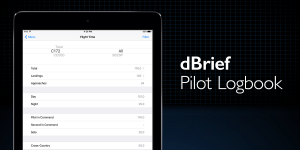
There is no shortage of logbook apps on the market for iPhone and iPad, and even the big companies like Garmin and ForeFlight are integrating this feature right in their EFB apps. Most of these programs include logging and tracking features that go way beyond the basics of the paper logbook they replace, including the ability to track and analyze every detail of your qualifications and currency.
While professional pilots and those that fly a variety of different aircraft models will appreciate these extra features, it’s often overkill for the weekend pilot who flies the same Cessna routinely in VFR conditions. That’s why the dBrief Pilot Logbook was created, to offer a simple solution for pilots who are looking for a quick, free and painless way to keep track of flight times on an iPhone or iPad.
Getting Started with dBrief
When you first launch the app you’ll see a basic menu with the option to Add a Flight at the top of the screen. This takes you to a data entry page to enter all flight details and times. The app automatically sequences to the next field when each is complete, saving you time and unnecessary button pushing. Despite the no-frills approach, the logging is fairly complete here and includes all the necessary fields for instrument pilots to track things like approaches, actual/simulated instrument time and holding.
After entering a flight, you can see a listing of all logged flights on the dedicated Flight Log page, where you can tap an entry for more information or to modify it. You can also swipe down on this screen to search the entries.
The Record of Pilot Time page displays a summary of your flight time, broken down by various attributes. You can quickly filter this data by aircraft type and N# with the controls at the top.
You can also display a listing of all your flight times broken down by the specific classifications required on the IACRA/FAA 8710-1 form, which is very useful when getting ready for a checkride with the FAA.
The Currency page shows you just that, including a breakdown of landings, flight time and approaches flown over various time intervals within the previous 12 months.
Advanced features
While dBrief is billed as “the simple” pilot logbook, there are a few advanced features to help you get some additional functionality. First you’ll want to create a free user account in the Settings section of the app, which will automatically back up your logbook entries to the cloud. You can then log in with this account to other devices running the app to keep everything synced.
 Like most logbook apps, you can also export all your entries to a spreadsheet in the universal CSV format, allowing you to manually backup the logbook. This should also give you peace of mind that your data isn’t being stored in any type of proprietary format.
Like most logbook apps, you can also export all your entries to a spreadsheet in the universal CSV format, allowing you to manually backup the logbook. This should also give you peace of mind that your data isn’t being stored in any type of proprietary format.
For those transitioning to the app from a previous digital logbook, you can use the dBrief website to import a CSV spreadsheet file right into your account, which will then sync up with the app. The Import utility includes a helpful guide to show you how to organize the spreadsheet and name the fields.
Lastly we’ll point out that this is one of the few aviation apps to take advantage of the iPhone 6s and 6s Plus 3D touch features. This allows you to firmly press down on the home screen icon when using a new model iPhone to quickly view Currency or go right to the Add a Flight page–pretty slick.
The dBrief logbook app is 100% free and can be downloaded here from the app store.
Source: Ipad appsdBrief logbook app focuses on simplicity


